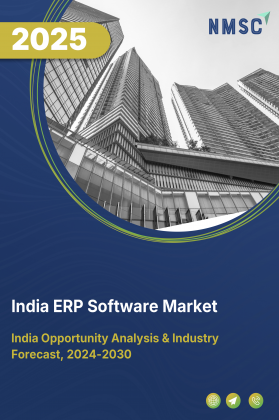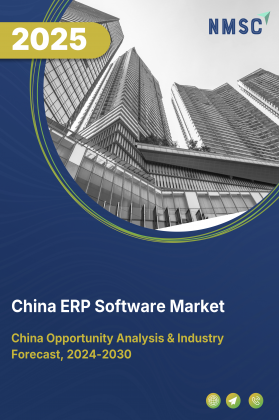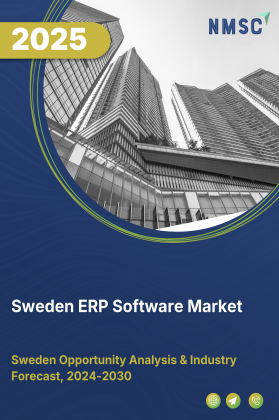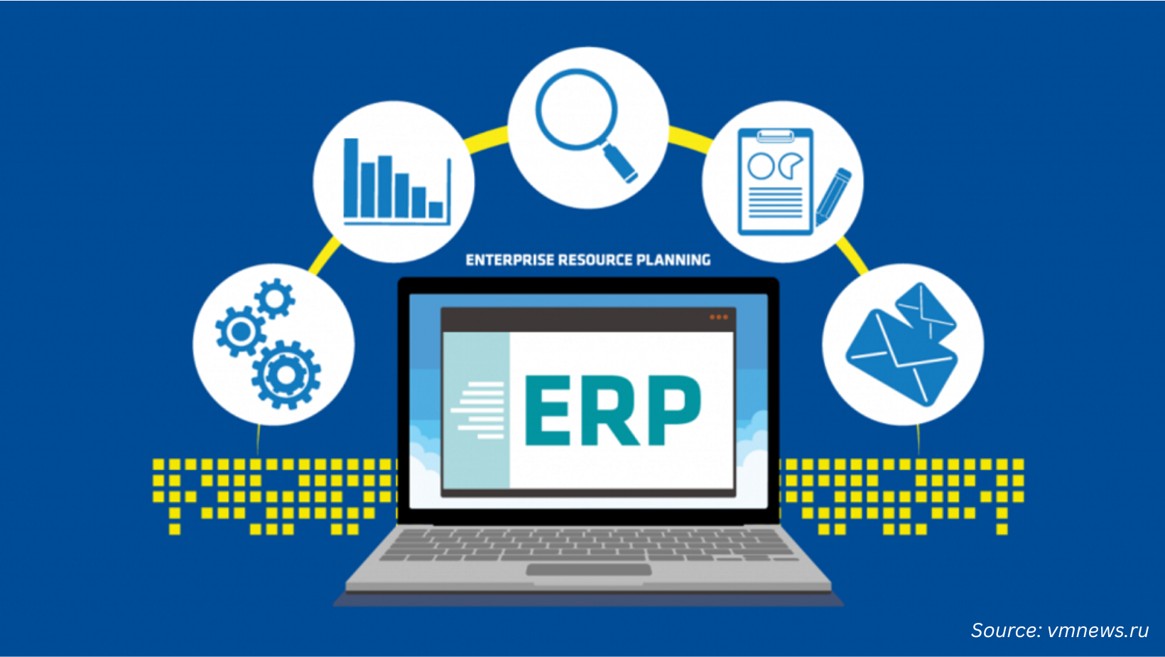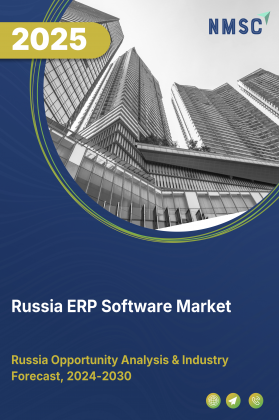
Russia ERP Software Market by Component (Software, and Services), Deployment (On-Premise, Cloud, and Hybrid), Business Function (Enterprise Asset Management, Financial Management, Human Capital Management, and Others), Application (Manufacturing, BFSI, Healthcare, Retail & Distribution, Government, IT & Telecom, and Others), and End Users (Small & Medium Enterprises, and Large Enterprises) – Trends and Forecast, 2025–2030
Industry: ICT & Media | Publish Date: 17-Oct-2025 | No of Pages: N/A | No. of Tables: N/A | No. of Figures: N/A | Format: PDF | Report Code : IC3607
Industry Outlook
The Russia ERP Software Market size was valued at USD 1.31 billion in 2024 and is projected to grow to USD 1.48 billion by 2025. Additionally, the industry is expected to continue its growth trajectory, reaching USD 2.01 billion by 2030, with a CAGR of 6.39% from 2025 to 2030.
The market development is driven by a strategic focus on developing domestic ERP solutions following the exit of Western providers like SAP. State-backed initiatives aim to enhance digital sovereignty and create software tailored to local industry needs, supporting national self-reliance in enterprise technology. The expanding construction sector also contributes significantly to ERP adoption, as firms require integrated platforms to manage complex projects and regulatory compliance.
However, ongoing international sanctions and limited access to advanced global ERP technologies present challenges, as many domestic solutions still face issues with scalability and functionality. Meanwhile, IoT integration in ERP systems is emerging as a key growth driver by providing real-time data visibility and predictive maintenance, improving operational efficiency in sectors like manufacturing and logistics.
Government Initiative Strengthens the Russia ERP Software Market Demand
As part of a broader government initiative to strengthen digital sovereignty, Russia has intensified its efforts to develop homegrown ERP software solutions following the withdrawal of Western providers like SAP by March 2024. A key milestone in this strategy was reached in May 2024, when state corporations, under government coordination, collaborated to build a domestic ERP platform based on Galaxy technologies. This project reflects the national push to reduce dependence on foreign software and bolster self-reliance in critical enterprise systems. By catering to the specific needs of Russian industries and encouraging local innovation, the development of indigenous ERP solutions is driving growth and reinforcing the country’s technological independence.
Construction Sector Growth Fuels the Russia ERP Software Market Expansion
The expansion of Russia’s construction sector is a key driver of ERP demand. Valued at USD 183.65 billion in 2024, the market is expected to reach USD 188.60 billion in 2025 and USD 227.58 billion by 2030, with a CAGR of 3.8% from 2025 to 2030. This steady growth is propelled by government-backed infrastructure projects and urban development. Construction firms increasingly depend on ERP systems to handle large-scale project planning, compliance, and resource optimization. As complexity and scale increase, integrated ERP platforms become vital to ensuring efficiency and operational control.
Limited Technology Access Hinder ERP Adoption
Ongoing international sanctions and the withdrawal of global ERP providers have significantly restricted access to mature and advanced ERP technologies in Russia. Although domestic systems are emerging, many of them face limitations in scalability, functionality, and long-term support. These challenges reduce confidence among large enterprises and delay widespread ERP adoption, particularly for organizations requiring highly customizable or feature-rich solutions.
IoT Integration Drives Growth Opportunities in ERP Systems
The integration of Internet of Things (IoT) technology with ERP systems is rapidly emerging as a key growth catalyst, offering real-time data visibility and enhanced operational control. IoT-enabled ERP platforms enable businesses to track inventory, monitor equipment performance, and forecast maintenance needs greatly improving operational efficiency in sectors such as manufacturing and logistics. In March 2025, Epicor Software Corporation introduced Epicor Kinetic 2025, a next-generation ERP solution featuring advanced IoT capabilities for real-time monitoring and predictive maintenance in manufacturing environments. This innovation underscores the transformative impact of IoT on ERP functionality and highlights the rising demand for intelligent, connected enterprise solutions.
Competitive Landscape
The market players operating in the Russia ERP software industry include SAP SE, Microsoft Corporation, Rockwell Automation, Oracle Netsuite, Infor and others.
Note: Most companies have suspended their operations due to war and the resulting instability.
Russia ERP Software Market Key Segments
By Component
-
Software
-
Service
By Deployment
-
On Premise
-
Cloud
-
Hybrid
By Business Function
-
Enterprise Asset Management (EAM)
-
Record Assets (Asset Mgmt)
-
Analytics & BI
-
Disposal of Assets
-
Others
-
-
Financial Management System
-
Core Financials
-
Corporate Performance Mgmt (CPM)
-
Financial Consolidation
-
Others
-
-
Human Capital Management (HCM)
-
Talent Management
-
Administrative HR
-
Workforce Management
-
Others
-
-
Manufacturing and Operations
-
Production Planning and Scheduling Products
-
Production Ops and Control Products
-
Manufacturing Information Mgmt Products
-
Others
-
-
Supply Chain Management (SCM)
-
Inventory management
-
Warehouse management
-
Transportation management
-
Procurement
-
Contract Management
-
-
Others
By Application
-
Manufacturing
-
BFSI
-
Healthcare
-
Retail & Distribution
-
Government
-
IT & Telecom
-
Construction
-
Aerospace Defense
-
Other Industries
By End Users
-
Small and Medium-Sized Enterprise
-
Large Enterprise
Key Players
-
Microsoft Corporation
-
Infor
-
Oracle Netsuite
Note: Most companies have suspended their operations due to war and the resulting instability.
Report Scope and Segmentation
|
Parameters |
Details |
|
Market Size in 2025 |
USD 1.48 Billion |
|
Revenue Forecast in 2030 |
USD 2.01 Billion |
|
Growth Rate |
CAGR of 6.39% from 2025 to 2030 |
|
Analysis Period |
2024–2030 |
|
Base Year Considered |
2024 |
|
Forecast Period |
2025–2030 |
|
Market Size Estimation |
Billion (USD) |
|
Growth Factors |
|
|
Companies Profiled |
03 |
|
Market Share |
Available for 10 companies |
|
Customization Scope |
Free customization (equivalent up to 80 working hours of analysts) after purchase. Addition or alteration to country, regional, and segment scope. |
|
Pricing and Purchase Options |
Avail customized purchase options to meet your exact research needs. |

















 Speak to Our Analyst
Speak to Our Analyst



